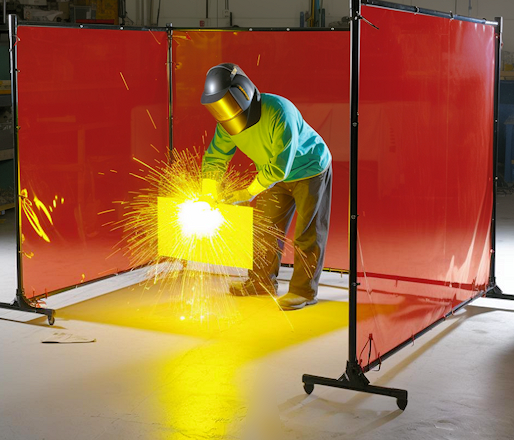Wherever welding is done, whether in a large industrial premise or a small workshop, there must always be awareness of the safety hazards involved. These include danger from fumes, spatter and sparks, radiation, lack of oxygen and burns.
Therefore, welders and bystanders should be protected, and one effective way to do this is by using welding screens such as those provided by Strip Curtains Direct. Here, we ask them to explain what welding screens are and their crucial role in keeping personnel safe.
What is a Welding Screen?

Also referred to as a welding curtain, a welding screen is a very effective protective barrier between the welder and anyone working or passing nearby. A welding screen can be used anywhere and in any required configuration, such as curtains, booths and portable shields. Flame retardant, fully portable for flexibility and made from highly durable material such as flame-resistant vinyl welding screens protect against sparks, radiation and debris. They are designed to absorb and diffuse welding flash.
What is a Welding Screen Made From?
This very much depends on where they will be used and in what context. Getting the correct screen type to obtain complete protection is essential. Welding screens are usually made from flame-resistant PVC, vinyl, polyurethane, polycarbonate or aluminium. These are materials proven to be effective in providing protection and long-life durability. They can also be produced in various colours and transparency levels depending on the specific welding process and the level of protection required. If you are looking for welding screens, consider getting help from a company specialising in the supply of welding screens, which will be able to advise on the best setup for your needs.
Where a Welding Screen Should Be Used?
Wherever welding occurs, safety should be a primary consideration from the start to keep the working environment and surrounding areas safe.
- In enclosed spaces, a screen can prevent stray sparks and spatter from escaping and potentially causing injury through fire or explosions.
- In a busy environment where many people are in or around the working area- a welding screen is vital to protect them from any hazards.
Specific and specialist welding processes, such as Shielded Metal Arc Welding, can produce more stray sparks and splatter than other methods, making a welding screen even more crucial for protecting nearby personnel.
What are the Benefits of Using a Welding Screen?
- UV and Infrared Protection – welding processes generate intense heat and emit harmful UV and IR radiation. A welding screen is designed to absorb or block out these types of radiation altogether, helping to protect welders and other nearby personnel.
- Spark and Spatter Protection – welding often produces hazardous sparks, molten metal spatter and other debris. A welding screen is a physical barrier to prevent these from harming nearby workers, equipment or combustible materials. This helps to reduce the risk of fires and associated injuries.
- Workplace Partitioning – welding screens are extremely useful in designating specific areas within the workplace where welding is to be done. By positioning screens around the designated area, other workers and activities can be safely separated from the welding processes, reducing the risk of injuries and accidents.
- Portable and Adjustable – one of the most valuable advantages of welding screens is their portability, meaning they can be moved where needed. This is useful in a work environment where a welding task may be performed at different locations.
In conclusion, welding screens are essential pieces of safety equipment that protect workers, equipment and premises. Investment in quality screens creates a safer and more efficient workplace.















